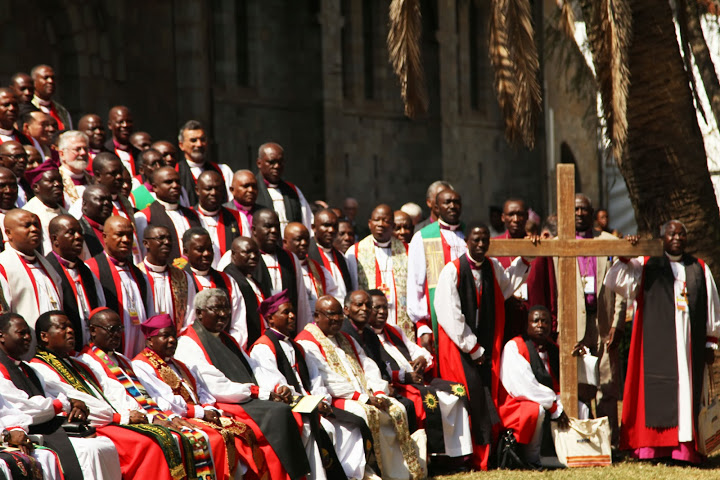GAFCON offers itself as 'important and effective instrument of Communion'

GAFCON2013 began by learning from the East African Revival and ended with the singing of the revival song 'Tukutendereza Jesu' in response to the reading of the Nairobi Communique and Commitment.
Three thousand words in length, it sets the following path for this global movement that "will continue to work within the Anglican Communion for its renewal and reform".
To that end it identifies as a priority "supporting genuine gospel initiatives, recognising that there are times when the maintenance of structures can constrain the proclamation of the Gospel".
In line with the 2008 GAFCON Jerusalem Statement's expectation that the Primates' Council would intervene to provide "orthodox oversight to churches under false leadership", the Primates' Council will carefully consider working beyond existing structures as an obedient response to Jesus' commission to take the Gospel to all nations.
The significance of this statement is that it speaks for over 300 bishops and archbishops around the Anglican Communion.
For the Church of England the Nairobi Commitment states:
"We commit ourselves to the support and defence of those who in standing for apostolic truth are marginalised or excluded from formal communion with other Anglicans in their dioceses. We have therefore recognised the Anglican Mission in England (AMiE) as an expression of authentic Anglicanism both for those within and outside the Church of England, and welcomed their intention to appoint a General Secretary of AMiE."
In the statement the Conference "appreciated that the Archbishop of Canterbury sent personal greetings via video and gave us the assurance of his prayers, and we likewise pray for him. We believe we have acted as an important and effective instrument of Communion during a period in which other instruments of Communion have failed both to uphold gospel priorities in the Church, and to heal the divisions among us."
The Statement deliberately embraces major traditions within Anglicanism:
"As a response to the crisis, we adopted The Jerusalem Statement and Declaration which commits us to biblical faithfulness, and has since provided the framework for renewed Anglican orthodoxy to which we, in all our different traditions – Evangelicals, Anglo-Catholics and Charismatics – are committed. We also formed the Global Fellowship of Confessing Anglicans (GFCA)."
On the current crisis in the Anglican Communion the statement says:
"We grieve that several national governments, aided by some church leaders, have claimed to redefine marriage and have turned same-sex marriage into a human rights issue. Human rights, we believe, are founded on a true understanding of human nature, which is that we are created in God's image, male and female such that a man shall leave his father and mother and be joined to his wife (Matthew 19:6; Ephesians 5:31). We want to make clear that any civil partnership of a sexual nature does not receive the blessing of God. We continue to pray for and offer pastoral support to Christians struggling with same-sex temptation who remain celibate in obedience to Christ and affirm them in their faithfulness."
The movement is taking steps to strengthen its fellowship:
"First, we have resolved to be more than a network. We are an effective expression of faithful Anglicanism and therefore, recognising our responsibilities, we must organise ourselves in a way that demonstrates the seriousness of our objectives. These are threefold.
"Proclaiming and contending for the gospel of Jesus Christ. Examples of work we wish to resource are the preparation of convincing theological rebuttals of any false gospel; supporting a network of theological colleges whose students are better oriented to ministry, whose faculties are well-trained, and whose curricula are built on the faithful reading of Scripture.
"Building the fellowship. We need to find new ways of supporting each other in mission and discipleship.
Authorising and affirming faithful Anglicans who have been excluded by their diocese or province. The main thrust of work here would be devoted to discerning the need for new provinces, dioceses and churches — and then authenticating their ministries and orders as Anglican.
"Second, pursuing these objectives will require GFCA to operate on a more systematic basis and to that end we shall organise around a Primates' Council, a Board of Trustees, an Executive Committee and regional liaison officers, who will be involved in fostering communication among FCAs.
"Third, we recognise that moving the GFCA on to a new footing will involve making substantial new resources available. We must, therefore, invite provinces, dioceses, mission agencies, local congregations and individuals formally to become contributing members of the GFCA. In particular, we ask provinces to reconsider their support for those Anglican structures that are used to undermine biblical faithfulness and contribute instead, or additionally, to the financing of the GFCA's on-going needs."
The statement names the following priorities:
Evangelising areas of the world where gospel witness has been obscured or lost, to unreached people and children and young people; supporting genuine gospel initiatives; publicly exposing any false gospel not consistent with apostolic teaching; deepening discipleship; engaging graciously in the public square; working for the transformation of society; working for the protection of the environment and economic empowerment of those deprived of resources, and attending to the marginalised and oppressed; affirming the vital contribution of women in the life of the church while differing over the roles men and woman have in church leadership; repudiating all violence against women and children; calling on governments and leaders of religions to respect human rights, protect Christians from violent attack and take effective action to provide freedom of religious expression for all.
The full statement can be read at www.gafcon.org











